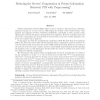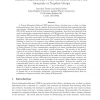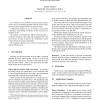15 search results - page 1 / 3 » Reducing the Servers Computation in Private Information Retr... |
CRYPTO
2000
Springer
13 years 9 months ago
2000
Springer
Private information retrieval (PIR) enables a user to retrieve a data item from a database, replicated among one or more servers, while hiding the identity of the retrieved item. ...
ISW
2010
Springer
13 years 2 months ago
2010
Springer
A Private Information Retrieval (PIR) protocol allows a database user, or client, to obtain information from a data- base in a manner that prevents the database from knowing which...
GI
2001
Springer
13 years 9 months ago
2001
Springer
In e-commerce, the protection of user privacy from a server was not considered feasible until the private information retrieval (PIR) problem was stated recently. A PIR protocol a...
COCO
2005
Springer
13 years 10 months ago
2005
Springer
A t-private private information retrieval (PIR) scheme allows a user to retrieve the ith bit of an n-bit string x replicated among k servers, while any coalition of up to t server...
CCS
2010
ACM
13 years 9 months ago
2010
ACM
Private Information Retrieval (PIR) protocols allow users to learn data items stored at a server which is not fully trusted, without disclosing to the server the particular data e...



